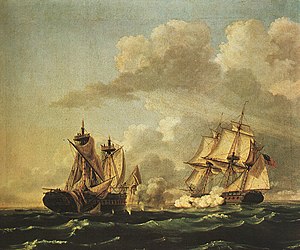HMS Macedonian

HMS Macedonian versus USS United States By Thomas Birch
|
|
| History | |
|---|---|
|
|
|
| Name: | HMS Macedonian |
| Ordered: | 28 September 1808 |
| Builder: | Woolwich Dockyard |
| Laid down: | May 1809 |
| Launched: | 2 June 1810 |
| Out of service: | 25 October 1812 |
| Fate: | Captured |
|
|
|
| Name: | USS Macedonian |
| Acquired: | 25 October 1812 |
| Commissioned: | April 1813 |
| Decommissioned: | 1828 |
| Fate: | Broken up, 1834 |
| General characteristics | |
| Class and type: | Lively-class frigate |
| Tons burthen: | 1082 bm |
| Length: | 156 ft (48 m) |
| Beam: | 38 ft 9 in (11.81 m) |
| Draft: | 18 ft 4 in (5.59 m) |
| Propulsion: | Sail |
| Complement: | 306 officers and enlisted |
| Armament: |
rated as 38 guns 28 × 18-pounder guns 14 × 32-pounder carronades |
rated as 38 guns
HMS Macedonian was a 38-gun fifth rate Lively-class frigate in the Royal Navy, later captured by USS United States during the War of 1812. She was built at Woolwich Dockyard, England in 1809, launched 2 June 1810 and commissioned the same month. She was commanded by Captain Lord William FitzRoy. Among the original crew was the 13-year-old Samuel Leech, who later wrote a memoir of his experiences.
Macedonian first delivered a company of soldiers to Lisbon, Portugal, then remained in the area, guarding against the possibility of French naval attack. During this period, FitzRoy made personal profit by falsification of records of ships' stores, for which he was court-martialled in March 1811 and dismissed from the service (he was quietly reinstated in August, presumably due to his aristocratic rank).
FitzRoy's replacement, William Waldegrave, was an interim appointment whose command lasted for only a few weeks before he was himself replaced by John Surnam Carden. One of Carden's first actions was to hire a band, a move popular with the crew, but he did not get along with the first lieutenant David Hope.
In January 1812, Macedonian was ordered to secretly deliver some bills of exchange to Norfolk, Virginia and to bring back an equivalent quantity of gold and silver currency, as part of a scheme to keep the Bank of England solvent. During the visit, Carden socialised with the notables of Norfolk, including Captain Stephen Decatur, but bungled the mission by inadvertently revealing what was planned, and had to return to Lisbon empty handed. Captain Carden dined frequently with Decatur and his wife Susan and jokingly bet a beaver hat on the outcome of a battle of their ships. They had come to consider one another friends.
...
Wikipedia
